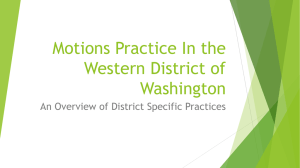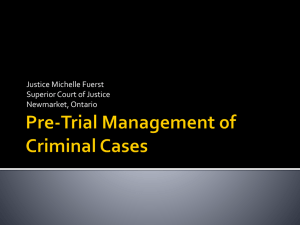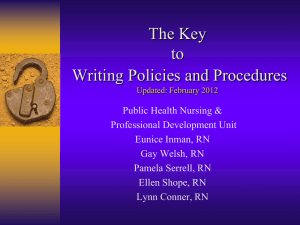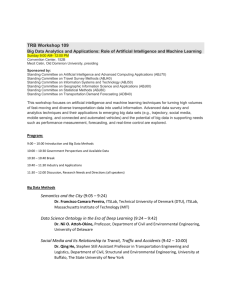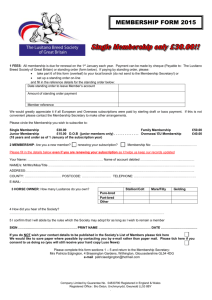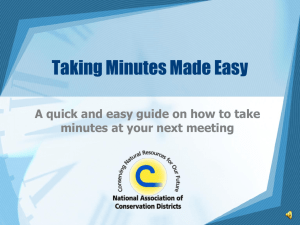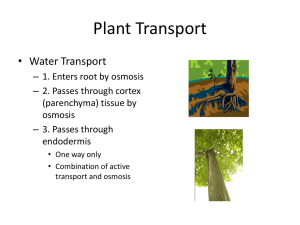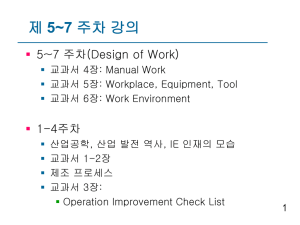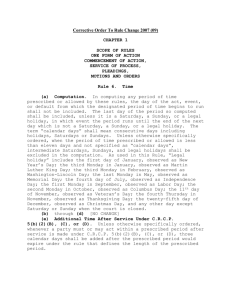Standing Order - Circuit Court of Cook County
advertisement
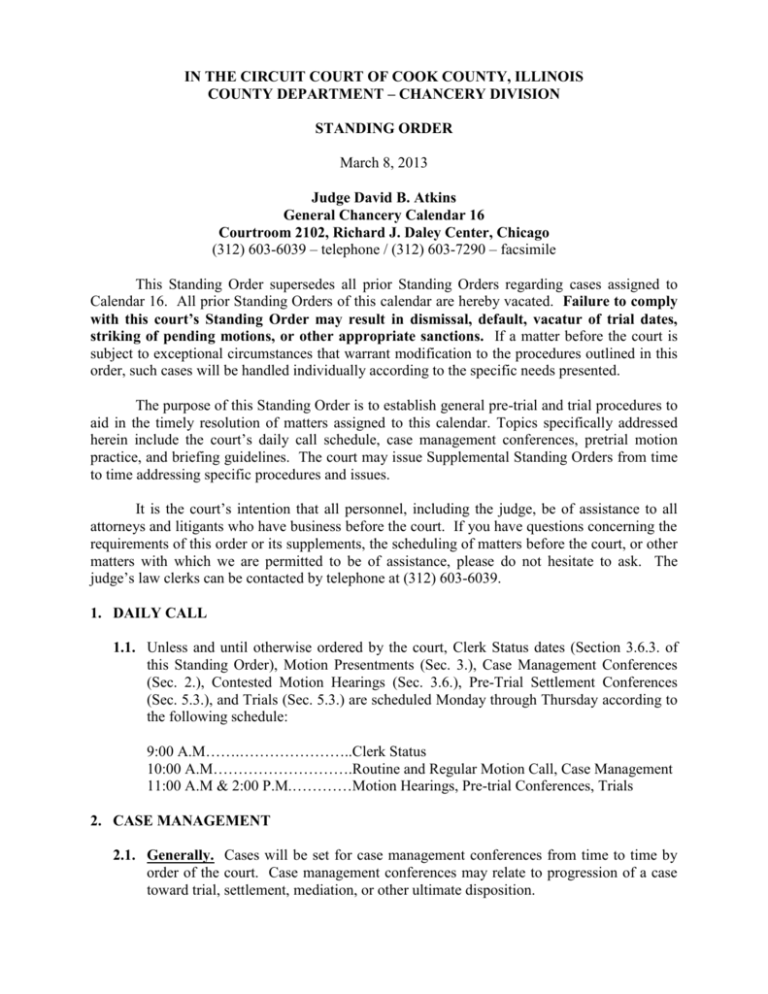
IN THE CIRCUIT COURT OF COOK COUNTY, ILLINOIS COUNTY DEPARTMENT – CHANCERY DIVISION STANDING ORDER March 8, 2013 Judge David B. Atkins General Chancery Calendar 16 Courtroom 2102, Richard J. Daley Center, Chicago (312) 603-6039 – telephone / (312) 603-7290 – facsimile This Standing Order supersedes all prior Standing Orders regarding cases assigned to Calendar 16. All prior Standing Orders of this calendar are hereby vacated. Failure to comply with this court’s Standing Order may result in dismissal, default, vacatur of trial dates, striking of pending motions, or other appropriate sanctions. If a matter before the court is subject to exceptional circumstances that warrant modification to the procedures outlined in this order, such cases will be handled individually according to the specific needs presented. The purpose of this Standing Order is to establish general pre-trial and trial procedures to aid in the timely resolution of matters assigned to this calendar. Topics specifically addressed herein include the court’s daily call schedule, case management conferences, pretrial motion practice, and briefing guidelines. The court may issue Supplemental Standing Orders from time to time addressing specific procedures and issues. It is the court’s intention that all personnel, including the judge, be of assistance to all attorneys and litigants who have business before the court. If you have questions concerning the requirements of this order or its supplements, the scheduling of matters before the court, or other matters with which we are permitted to be of assistance, please do not hesitate to ask. The judge’s law clerks can be contacted by telephone at (312) 603-6039. 1. DAILY CALL 1.1. Unless and until otherwise ordered by the court, Clerk Status dates (Section 3.6.3. of this Standing Order), Motion Presentments (Sec. 3.), Case Management Conferences (Sec. 2.), Contested Motion Hearings (Sec. 3.6.), Pre-Trial Settlement Conferences (Sec. 5.3.), and Trials (Sec. 5.3.) are scheduled Monday through Thursday according to the following schedule: 9:00 A.M…….…………………..Clerk Status 10:00 A.M……………………….Routine and Regular Motion Call, Case Management 11:00 A.M & 2:00 P.M.…………Motion Hearings, Pre-trial Conferences, Trials 2. CASE MANAGEMENT 2.1. Generally. Cases will be set for case management conferences from time to time by order of the court. Case management conferences may relate to progression of a case toward trial, settlement, mediation, or other ultimate disposition. Standing Order – Judge Atkins – March 8, 2013 2.2. Initial Case Management Conferences. An Initial Case Management Conference is held approximately One Hundred Eighty (180) days after the initial filing date of each case. Notice of the Initial Case Management Conference will be mailed by the clerk of the court, and may also be published in the Chicago Daily Law Bulletin. At the parties’ first case management conference, the court will commence its supervision of service of process upon all named parties, the discovery process, settlement, and other litigation matters. Counsel familiar with the case and any pro se litigants must appear. Plaintiff’s failure to attend the Initial Case Management may result in dismissal of the case for want of prosecution. All parties must be prepared to inform the court of all contemplated discovery, both written and oral, and the length of time that each party estimates will be necessary for the completion of discovery. The parties should also be prepared to report the status of the pleadings, any pending or contemplated pre-trial motions, and other matters mandated by Supreme Court Rule 218. If the parties appear before the court prior to the initial case management conference, the date set for initial case management is superseded by any new dates set by the court, unless otherwise ordered. 2.3. Continued Case Management. Cases will be continued from time to time for further case management conferences to: (1) afford the court an opportunity to monitor the status of all matters, (2) enable the court to enter such orders as it deems appropriate, and (3) facilitate proper discovery and pre-trial motion practice with a view to the expeditious and reasonable preparation of cases for trial or for other disposition. 2.4. Attendance Mandatory. Repeated failure to attend scheduled case management conferences may result in the entry of an order dismissing the case for want of prosecution, an order of default, or other appropriate sanctions pursuant to Supreme Court Rules 218 and 219. 3. MOTION PRACTICE 3.1. Generally. Except as otherwise specified herein with respect to Routine Motions and Orders (Sec. 3.4 of this Standing Order) and Emergency Motions (Sec. 3.5), all motions must be spindled through the 8th floor of the Richard J. Daley Center for presentment before Judge Atkins during the 10:00 A.M. Motion Call or “piggy-backed” (Sec. 3.3) on a prior-set court date. 3.2. Regular Motion Call. The court’s Regular Motion Call takes place Monday through Thursday at 10:00 A.M. Cook County Circuit Court Rule 2.1 regarding notice of motions shall apply. Courtesy copies of motions spindled for presentment during the Regular Motion Call should be provided to the court on the same day the motion is filed. 3.3. “Piggy-Backed” Motions. With proper notice to counsel for all parties who have appeared and to any pro se parties, motions may be brought before the court, or “piggybacked,” at any regularly set Case Management Conference, Motion Hearing, or PreTrial Conference. The court must be provided with courtesy copies of all “piggybacked” motions at least two (2) days prior to the presentation date of the motion 2 of 7 Standing Order – Judge Atkins – March 8, 2013 3.4. Routine Motions / Orders. Routine Motions and Orders will be accepted in chambers Monday through Friday between 9:30 A.M. and 4:00 P.M. Alternatively, Routine Motions and Orders may be presented “off call” directly to Judge Atkins in courtroom 2102 at 10:00 A.M., Monday through Thursday, prior to the Regular Motion Call and scheduled Case Management Conferences. Finally, parties also have the option to spindle Routine Motions for Judge Atkins’ Regular Motion Call. All Routine Orders must be submitted to the court in triplicate. Only the following four matters will be considered by the court as routine or “off call,” unless otherwise authorized. 3.4.1. Rescheduling Orders. Agreed Orders to modify briefing schedules and/or reset Case Management Conferences and Motion Hearings must be coordinated with Judge Atkins’ law clerks by calling (312) 603-6039. The court may, from time to time, notify the parties and/or counsel prior to a pre-set Case Management Conference or Motion Hearing of a scheduling conflict and request that the parties collaborate in the drafting of an Agreed Order striking the previously set date and setting a new one according to specifications provided by the law clerks. It is the responsibility of the parties to deliver to chambers or fax the requested Agreed Order to (312) 603-7290 within Two (2) days of such rescheduling request. Failure to meet this deadline may result in the court striking a pending motion or setting a new date without input from the parties and/or counsel. Please note that it is not the responsibility of the court to return copies of entered Agreed Orders to the parties and/or counsel via facsimile. Hardcopies of entered Orders may be found in the basket outside courtroom 2102. 3.4.2. Special Process Servers. Motions to Appoint a Special Process Server may be brought directly to chambers. Where service is sought in Cook County, Motions for the Appointment of a Special Process Server must include a statement that service was attempted through the Sherriff’s Office. Such motions may also be spindled through the 8th floor. Three (3) copies of an order prepared by the movant must also be provided to the court. 3.4.3. Voluntary Dismissals. Agreed Orders to Dismiss cases in their entirety should be accompanied by a Stipulation to Dismiss signed by all parties and/or their counsel. Voluntary Dismissals of entire cases will also be accepted as routine motions. At least three (3) copies of an order dismissing the action must be provided to the court. Partial dismissals, disposing of only part of a case or dismissing selected parties, must be spindled for presentment. 3.4.4. Substitution of Judge as of Right. Motions for Substitution of Judge pursuant to 735 ILCS 5/2-1001(a)(2) may be delivered directly to chambers with notice to all parties. If contested, however, the motion must be spindled for presentment. 3.5. Emergency Motions and Temporary Restraining Orders. 3.5.1. Presentment and Hearing. Any party who wishes to bring an Emergency Motion must contact Judge Atkins’ chambers in person or by telephone at (312) 603-6039 to speak with the law clerks about obtaining a hearing date and time. 3 of 7 Standing Order – Judge Atkins – March 8, 2013 Hearings on Emergency Motions, unlike regular motions and trials, may be scheduled Monday through Friday. After a hearing date has been set, Notice of Emergency Motion must be filed with the Emergency Motion in the Clerk’s Office on the 8th floor. 3.5.2. Courtesy Copies. After speaking with one of the law clerks to obtain a hearing date, a file-stamped courtesy copy of the Notice of Emergency Motion, the Emergency Motion, and all supporting documents, including proof of service, must be hand delivered to the court NO LATER THAN 2:00 P.M. of the day before such motion is to be heard. Any motion delivered to chambers after 2:00 P.M. will not be eligible for hearing the following day. No exceptions. 3.5.3. Genuine Emergency. All Emergency Motions must contain a separately designated paragraph, ideally on the first page, which details the emergency nature of the motion. An emergency or exigent circumstance is a situation that demands unusual or immediate action due to some circumstance that could lead to irreparable harm to a party if relief is not obtained prior to the time the party could be heard on the court’s regular motion call or at the next scheduled case management conference. A motion brought within One Hundred Twenty (120) days of a set trial date may be brought as an emergency motion in order to protect the set trial date. Matters that have become urgent by reason of a party’s failure to seek timely relief do NOT constitute emergencies. A motion seeking an extension of time generally does not constitute an emergency. Such motions should be spindled through the 8th floor and may be brought after a deadline has passed pursuant to Supreme Court Rule 183. A motion to extend the discovery cut-off deadline that is filed prior to the cut-off date and noticed for hearing at the next scheduled court appearance is sufficient to show the court that the movant has done everything possible to comply with the discovery cut-off date. Therefore, it is not necessary to appear in court on an emergency basis to extend discovery. A motion to file a brief in excess of Twenty (20) pages is not an emergency, and a motion filed with the court and noticed for hearing at the next regularly scheduled court date is sufficient. Unless otherwise ordered by the court, any Emergency Motion that fails to set forth an emergency basis will NOT be scheduled for hearing before the next regularly scheduled court date. 3.5.4. Temporary Restraining Orders (TRO). A motion for TRO is an Emergency Motion and, as such, must adhere to all guidelines for Emergency Motions set forth in this Standing Order. Failure to do so may result in the court striking the motion or postponing a hearing until the next regularly scheduled court date. In addition, TRO Motions must be accompanied by a Verified Complaint. The Movant must notify all other parties of the date and time of the TRO hearing unless the motion for TRO is brought ex parte and it clearly appears from the specific facts shown by Affidavit or contained in the Verified Complaint that immediate and irreparable injury, loss, or damage will result to the applicant before notice can be served and a hearing had thereon. See 735 ILCS 5/11-101. 4 of 7 Standing Order – Judge Atkins – March 8, 2013 3.6. Contested Motions and Motion Hearings 3.6.1. Automatic Briefing Schedule. Unless otherwise ordered by the court, the respondent to a contested motion that has been noticed for presentment to the court shall have Twenty-One (21) days to file a responsive brief. The twentyone days shall begin to run on the date of service of the motion and notice of motion to the respondent. The movant shall have Fourteen (14) days thereafter to file any reply. Alternatively, if the respondent appears in court on the date set for motion presentment and provides a good faith reason for delay in preparing his or her response, the court may grant respondent twenty-one days from the presentment date to respond and fourteen days thereafter for movant to reply. If the motion has been served on respondent a sufficient number of days prior to the date of presentation, the motion may be fully briefed when it is presented to the court, requiring only the scheduling of a hearing date. Counsel should remind opposing counsel of the automatic briefing schedule in the forwarding letter accompanying any notice of motion. For additional briefing guidelines, see Section 4. of this Standing Order. 3.6.2. Briefing Deadlines and Extensions. Unless otherwise ordered by the court, any brief filed after a briefing deadline shall be stricken. However, a good faith motion for extension of briefing deadlines may be filed after a briefing deadline but before the Clerk Status date. If the parties do not agree to a briefing extension, a motion for extension must be filed with the court and a courtesy copy of the motion must be provided to the court at least Two (2) days prior to the Clerk Status date. For Agreed Orders, see Section 3.4.1. of this Standing Order. 3.6.3. Supplemental Briefing. The parties will be permitted to file a Sur-Response and Sur-Reply only if a request is made by written motion and the court deems additional briefing necessary. Alternatively, the court may ask the parties to prepare and file additional briefings on specific and contentious issues not fully or satisfactorily addressed in the parties’ previously filed briefings. In such case, the parties are restricted to discussing only the questions posited by the court. 3.6.4. Clerk Status. At such time as the court enters a briefing schedule on a motion that has been or is to be filed, the court may then continue the pending motion for Clerk Status. Clerk Status dates are scheduled Monday through Thursday at 9:00 A.M. in courtroom 2102. At Clerk Status counsel for the parties will appear before the law clerk to inform the court of the status of all pending motions. For motions that are fully briefed as of Clerk Status, counsel shall provide one courtesy copy of all briefs and supporting documents to the law clerk. The law clerk will then schedule a motion hearing and movant’s counsel shall prepare an order continuing the fully-briefed motion(s) to the date and time provided. The court may continue any motion that is not fully briefed for subsequent status or choose to decide the motion only on the briefs prepared 5 of 7 Standing Order – Judge Atkins – March 8, 2013 and/or provided to the law clerk as of the status date. If movant’s counsel fails to appear for Clerk Status by 10:00 A.M., the court may strike the motion unless the court is notified beforehand about counsel’s inability to attend. 3.6.5. Courtesy Copies for Motion Hearings. For contested Motion Hearings, courtesy copies of the motion, response, reply, and all relevant pleadings and exhibits must be delivered to chambers at least Ten (10) days prior to the date of the hearing. This requirement is usually satisfied by delivery of courtesy copies at Clerk Status. For any motion where the court is called upon to rule on any previous briefing, such as a motion to reconsider, the movant must also provide courtesy copies of the previous briefing. See Section 4.2. for additional information on pleadings and previously-filed exhibits. If parties do not provide courtesy copies within the requisite Ten (10) days, the court may strike the motion or reschedule the Motion Hearing accordingly. 3.6.6. Appearance at Motion Hearings. Each movant and respondent must appear at each set Motion Hearing, either in person or through counsel. If a motion is set for oral argument and a pro se litigant or counsel for the parties does not appear, the court may rule based on the written briefs submitted or, at the court’s option, strike or deny the motion. 3.6.7. Rulings on Written Briefs Alone. The court may rule on any pending motion(s) based solely upon the written briefs submitted, without oral argument. If the court determines that oral argument is necessary to better understand the substance of the motion or arguments of counsel, then oral argument will be requested and/or permitted. 3.6.8. Motions to Reconsider. Counsel or pro se litigants contemplating a Motion to Reconsider should have in mind the pertinent standard. The court will accept any Motion to Reconsider and response thereto. Generally, no oral argument will be heard, unless deemed necessary by the court. Upon presentment, the court will schedule a Clerk Status for delivery of courtesy copies and to set a ruling date. 4. BRIEF AND CITATION GUIDELINES 4.1. Brief Length and Format. No brief shall exceed Twenty (20) double-spaced pages exclusive of exhibits. Any brief filed in excess of Twenty (20) pages requires leave of court. All briefs should be double-spaced with 12-point font and at least 1-inch margins. All Exhibits should be tabbed (located easily) and page-numbered, whenever possible. 4.2. Pleadings and Previously-Filed Exhibits. Parties filing a brief that cites or discussing pleadings or prior-filed motions and/or exhibits should not assume that the court has copies of such documents. The Clerk of the Circuit Court of Cook County keeps copies of all pleadings, but the judge hearing the case does not usually have the court file in chambers. Therefore, the movant must supply courtesy copies of all relevant pleadings, 6 of 7 Standing Order – Judge Atkins – March 8, 2013 briefings, orders, and prior-filed exhibits. If in doubt, please ask the law clerks whether copies of specific documents are required. 4.3. Citations and Submission of Cases as Exhibits. Citations shall adhere to the requirements of Illinois Supreme Court Rule 6, as amended May 31, 2011. Accurate pinpoint citations shall be included where appropriate. If cited authority is available only via LexisNexis and Westlaw, the LexisNexis citation is preferred. Parties may submit hardcopies of only significant cases cited in their briefs (i.e. those cases relied on other than for general propositions). 5. STANDING ORDER CONSIDERATIONS 5.1. Applicability and Inconsistency. Unless the court orders otherwise (either generally or in a particular circumstance), this Standing Order applies in every case. In the event of any inconsistency between this Standing Order and any order entered in a case, the order entered in the case controls to the extent of the inconsistency. 5.2. Modification. The court may modify this Standing Order at any time. Copies of Judge Atkins’ most recent Standing Order are available in courtroom 2102 and can be found online at www.cookcountycourt.org/JudgesPages/AtkinsDavidB.aspx. 5.3. Supplemental Standing Orders. The court may issue Supplemental Standing Orders addressing narrow issues of court procedures and requirements. Supplemental Standing Orders are issued as addenda to this Standing Order and, to the extent that any Supplemental Standing Order conflicts with any Section herein, this Standing Order shall supersede. Topics addressed by Supplemental Standing Orders may include the following: (1) Default and Default Judgments; (2) Discovery Disputes; (3) Pretrial Settlement Conferences; (4) Mediation; (5) Pretrial Procedures for Non-Jury/Bench Trials; and (6) Trial Scheduling and Procedures. Copies of Supplemental Standing Orders are available in courtroom 2102 and online. Any party unsure of the court’s required procedures relevant to any specific motion or stage of litigation should contact one of Judge Atkins’ law clerks at (312) 603-6039. __________________ Judge David B. Atkins The Court. 7 of 7
